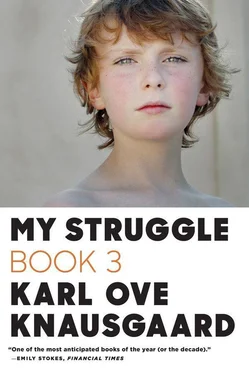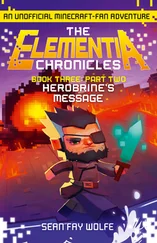Did I know that it couldn’t last?
No, I didn’t. I thought it would just go on and on forever. Spring came, and with it a lightness: one day I put on my new sneakers, and running in them after months of trudging around in various kinds of boots was like flying. Puffa pants and jackets, which made all movement so awkward and clumsy, were replaced by light trousers and light jackets. Gloves, scarves, and caps were packed away. Skis and skates and sleighs and sleds were put into sheds and garages; bikes and soccer balls were taken out, and the sun, which for so long had hung low in the sky and whose rays had been for the eyes only, rose higher and higher with every day that passed and was soon so hot that the jackets we put on in the morning were stuffed in our satchels when we returned from school at midday. But during these weeks the most telling sign of spring was the reek of burning garden refuse wafting across the estate. The cool evenings, the bluish darkness, the cold emanating from ditches still littered with the remains of snowdrifts, as hard as ice and studded with grit, the constant buzz of children’s voices outside, children running after a soccer ball in the road, others cycling up and down ditches or doing wheelies on the sidewalk, everything bubbled with life and lightness, you had to run, you had to cycle, you had to shout, you had to laugh, all with the pungent yet rich smell of burning spring grass that was suddenly everywhere in your nostrils. Now and then we ran up and watched: the low, dense flames like little orange waves, damp almost with the intensity of color brought out by the evening gloom, tended by a proud mother or father, often with a rake over their shoulder and gloves on their hands, like some kind of lower-middle-class knight. Now and then there were real bonfires they kept watch over, when all the trash they had collected in the garden during the winter was burned.
What was it about fire?
It was so alien here, it was so profoundly archaic that nothing about it could be associated with its surroundings: what was fire doing side by side with Gustavsen’s trailer? What was fire doing side by side with Anne Lene’s toy shovel? What was fire doing side by side with Kanestrøm’s sodden and faded garden furniture?
In all its various hues of yellow and red it stretched up to the sky, consuming crackling spruce twigs, melting hissing plastic, switching this way, switching that, in totally unpredictable patterns, as beautiful as they were unbelievable, but what were they doing here among us ordinary Norwegians on ordinary evenings in the 1970s?
Another world was revealed with the fire, and departed with it again. This was the world of air and water, earth and rock, sun and stars, the world of clouds and sky, all the old things that were always there and always had been, and which, for that reason, you didn’t think about. But the fire came, you saw it. And once you had seen it you couldn’t help seeing it everywhere, in all the fireplaces and wood-burning stoves, in all the factories and workshops, and in all the cars driving round the roads and in garages or outside houses in the evening, for fire burned there, too. Also cars were profoundly archaic. This immense antiquity actually resided in everything, from houses — made of brick or wood — to the water flowing through the pipes into and out of them, but since everything happens for the first time in every generation, and since this generation had broken with the previous one, this lay right at the back of our consciousness, if it was there at all, for in our heads we were not only modern 1970s people, our surroundings were also modern 1970s surroundings. And our feelings, those that swept through each and every one of us living there on these spring evenings, were modern feelings, with no other history than our own. And for those of us who were children, that meant no history. Everything was happening for the first time. We never considered the possibility that feelings were also old, perhaps not as old as water or the earth, but as old as humanity. Oh no, why would we? The feelings running through our breasts, which made us shout and scream, laugh and cry, were just part of who we were, more or less like fridges with a light that came on when the door was opened or houses with a doorbell that rang if it was pressed.
Did I really think it would last?
Yes, I did.
But it didn’t. One day toward the end of April I told Anne Lisbet we were going to go up to their place after school, and she said we couldn’t come.
“Why not?” I said.
“Someone else is coming over,” she said.
“Who?” I said, thinking perhaps it was an uncle or an aunt.
“It’s a secret,” she said, smiling her sly smile.
“Someone from the class?” I said. “Marianne or Sølvi or Unni?”
“It’s a secret,” she said. “You and Geir can’t come. Bye!”
I went over to Geir and told him what she had said. We decided to sneak over after school and spy on them. After dropping off our satchels at home we took the other way up, cut through the building site in the forest below, where the foundations for the new houses had already been built, crept through the trees, over the bog, and up to the cul-de-sac between their houses.
No one.
Were they indoors?
We couldn’t ring the bell, of course; we weren’t supposed to be there. We walked down. Geir had the brilliant idea of ringing the bell at Vemund’s house. He came out and stood in the doorway with that same stupid expression on his round face. Yes, they had gone down the hill some time ago.
Alone?
No, they were with two others.
Who?
‘Fraid he hadn’t seen.
Boys or girls?
Boys, he thought. At first he had assumed it was us, as we were here so much, but now he could see of course it must have been someone else!
He laughed. Geir laughed, too.
Who could it be?
And what were they doing with them?
“Come on, let’s follow them,” I said to Geir.
“But they didn’t want us with them,” Geir said. “Wouldn’t it be better to go to Vemund’s for a while?”
I stared at him, my eyes as wide as they could be.
“OK,” he said.
“Don’t say anything to the others,” I said to Vemund. He nodded, and then we walked across their property and down to the road.
Where could they be?
For all we knew, they could have gone all the way down to the shop. But something told me they would stay near the house. We joined the road below theirs. Four of them. They should be easy to see and hear.
“Should we go up?” I said, stopping at the crossroads where one road led up to Dag Magne’s and theirs.
Geir shrugged.
We walked up the gentle slope. Dag Magne’s house lay in a little dip. There was a garage adjacent to it, full of bikes and tools and car tires. Under the veranda there was a pile of wood.
Reaching the summit of the slope, we saw Dag Magne in a window looking out at us. To avoid giving the impression that we were on our way to see him we cut across their property without looking at him and down into the forest on the other side. Spring was in the air, the grass that had been white for so long was turning green, but there were no leaves on the trees, so we could see a long way into the young forest.
There. Directly below the slope to Solveig’s house I saw something blue and red moving.
“There they are,” Geir said.
We stopped and stood still.
They were laughing and chatting excitedly.
“Can you see who it is?” I whispered.
Geir shook his head.
We went closer. Hiding behind trees as far as we could. When we were about twenty meters away, we crouched down behind a rock.
I poked my head up and watched them.
It was Eivind and Geir B with them.
Читать дальше












